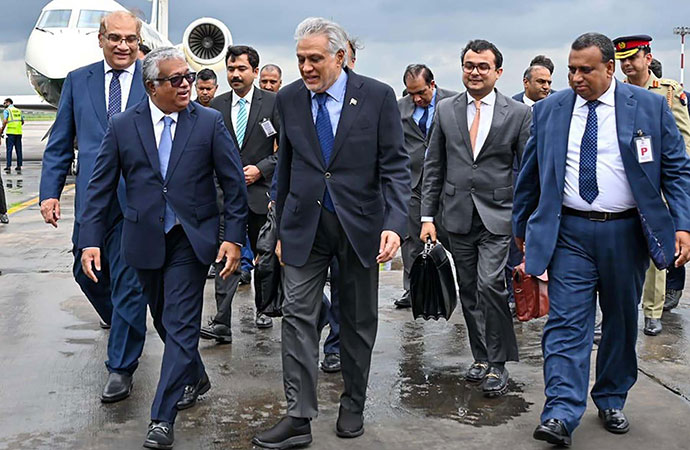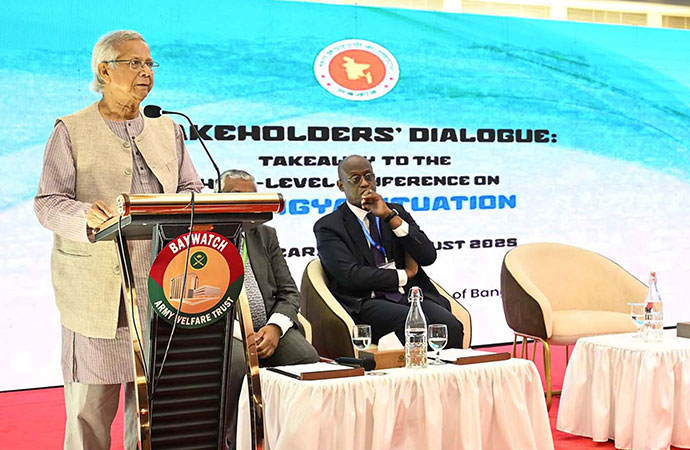Column

Pakistan's Deputy Prime Minister and Foreign Minister Mohammed Ishaq Dar welcomed him upon his arrival at Hazrat Shahjalal International Airport (HSIA) on 23 August 2025. Photo: PID
Pakistan Deputy Prime Minister and Foreign Minister Ishaq Dar's landmark visit to Bangladesh was a diplomatic triumph for both countries. It inaugurated a fresh chapter in their relations after a long period of effective dissociation. Writing from a distance, I am unable to go into an analysis of the details of what was achieved and what was not during that visit. Generally, of course, it is better when countries talk at the highest levels than when they do not. Beyond that, ministerial visits have to be judged by what they result in - or not. That remains to be seen. But even from a distance, it is possible to discern the historical provenance of recently-rejuvenated ties between Dhaka and Islamabad without forgetting the agency of Delhi. India provides a historical template of South Asian relations within which regional countries have to work, not as satraps or even satellite states but as independent players who, yet, must recognise disparities of power and influence as they engage one another.
The visit brings back to mind my Cambridge days, when I was studying South Asian and Southeast Asian strategic relations for my Master of Letters thesis. It was in the early 1990s. Two friends - a Bangladeshi physicist and an Indian historian - visited me one evening. It was an excellent gathering of people who spoke their minds. Everything went well till the Bangladeshi physicist blamed the 1947 Partition of Bengal on the machinations of the "other" side. The Indian historian kept quiet for a while. Then, she tried to speak. The Bangladeshi turned his head away dismissively. The Indian rose from her seat with her half-emptied can of Bodington beer and emptied it on his head. The Bangladeshi wasted no time in emptying a nearly-full can of Kronenbourg 1664 on her head. I almost screamed. Not only had they wasted my beer on their heads but they had forced me to bring out two fresh towels for them to sober up after bathing, not to say making me wonder how to clean up the carpet once they had left. My landlord was a Pakistani who was British-naturalised and very liberal and cosmopolitan, but no one is liberal enough to ignore the alcoholic stink of history rising from his expensive Persian carpet.
I survived that episode financially. But it reminded me that history is a visceral issue. Even physicists are not free of the laws of historical gravity, any more than historians are free of the laws of physical gravity. The point is to remain grounded because that is where we all belong, whoever and wherever we are.
Bangladesh today
From a historical perspective, it is undeniable that Bangladesh is a result of two immediate partitions: the secession of Pakistan from India in 1947 and the liberation of East Pakistan from West Pakistan in 1971. In the first instance, the Muslim-majority inhabitants of East Bengal supported the two-nation theory that demanded a separate homeland for the subcontinent's Muslims. In the second instance - the reasons for which are familiar to every Bangladeshi - the Bengali-majority inhabitants of Muslim East Pakistan embraced what was really a three-nation theory. That theory accepted Jinnah's two-nation theory (without which East Bengal would have become a part of India) but rejected the West Pakistani capture of subsequent Pakistani statehood to delegitimise Bengali nationhood. Sadly, Pakistan did not become a state within which different nations could coexist. The result was 1971 - only 24 years after 1971.
Bangladesh's independence reconciled the two realities - those of Muslimness and Bengaliness.
In 2009, the scholar-diplomat Iftekhar Ahmed Chowdhury, who had served as Foreign Adviser (Foreign Minister) from 2007 to 2009, wrote an excellent article which argued that the rationale for Bangladesh's independence from Pakistan and from India earlier was located in its identity as a nation-state that was both Bengali and Muslim. Historically "what is now the Bangladesh nation evolved through its having to deal with the West Bengali Hindu community, now a part of India", and fellow-Muslims in the rest of South Asia, "most of the latter eventually assuming the form of Pakistan". Chowdhury says that it took three partitions for Bangladesh to find itself: The Partition of 1905, which hived off East Bengal from Bengal and connected it to Assam; the Partition of 1947, when East Bengal was separated from West Bengal once again to create Pakistan this time; and finally the Partition of 1971, when East Bengal (later East Pakistan) was bifurcated from West Pakistan, leading to the birth of a sovereign and independent state, Bangladesh.
Why so many partitions? Chowdhury's explanation is clear: "After experience had indicated a distinct set of interests for Bengali Muslims, their basic strategy in countering threat perceptions from one community was to seek an alliance with the other. The perceived threats were seen to be to one or the other of their attributes - to their Bengaliness or to their Muslimness."
Chowdhury concludes: "Importantly, Bangladesh is now a 'sated' or 'satisfied' nation, secure in the knowledge that neither of its two attributes of Muslimness or Bengaliness is being seriously threatened by external actors or elements, given the country's sovereign status."
Marvellously put. Bangladesh is a sated nation - a nation which is not a part of India or Pakistan or anyone else but is in charge of its existence and its destiny. On the foreign front, Bangladesh has obvious historical ties with both India and Pakistan, whose own contemporary relations are bemusing at best and worrisome at worst. As a satisfied nation, Bangladesh has no need to be a proxy state of either of the two South Asian nuclear powers.
Bangladesh does not need to be pro-India or pro-Pakistan. All it needs is to be pro-itself - pro-Bangladesh.
That is what I thought in Cambridge three decades ago as the physicist and the historian left for the day. That is what I believe even today.
The writer is Principal Research Fellow of the Cosmos Foundation. He may be reached at epaaropaar@gmail.com

























Leave a Comment
Recent Posts
Religion and Politics: A Toxic ...
At Dhaka University, cafeteria workers have been told not to wear shor ...
Enayetullah Khan joins AsiaNet ...
AsiaNet’s annual board meeting and forum was held in Singapore, ...
In a New York minute
Many leaders back a UN call to address challenges to ..
Defaulted loans at Non-Bank Financial Institutions ( ..
How the late Zubeen Garg embodied cultural affinitie ..